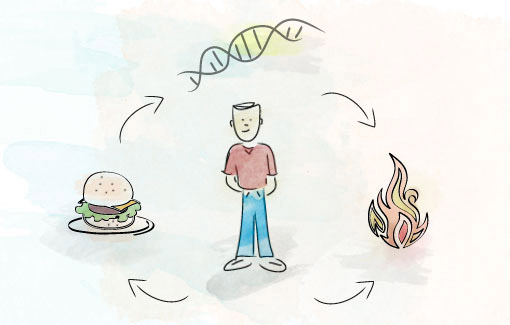UAB Researchers Say Diet Plays a Key Role
By Matt Windsor
 Depression is linked with diet (especially consumption of omega-6 fatty acids, such as those found in the typical Western diet) and inflammation, as well as genetics. UAB researchers are investigating dietary interventions as a way to prevent depression in at-risk children.
Depression is linked with diet (especially consumption of omega-6 fatty acids, such as those found in the typical Western diet) and inflammation, as well as genetics. UAB researchers are investigating dietary interventions as a way to prevent depression in at-risk children.
Investigators at UAB are pursuing several exciting new ways to treat depression by targeting the neurotransmitter glutamate. (See more in part 1 of this story here.) But there is a limit to what medicines can do, cautions Richard Shelton, M.D., professor and vice chair of research in the UAB Department of Psychiatry and director of UAB’s new Mood Disorders Program. “I don’t think we can just ‘drug all our problems away,’” he says. “Another very exciting element in our research program is a search for preventive treatments.”
Obesity and Depression
Food is a major factor. “Diet-associated obesity is a key risk factor for becoming depressed,” Shelton says, “but not for the reason that most people assume. Interestingly, it does not appear to be related to how people feel about how they look. Even in cultures where extra weight is not a big deal, obesity is still associated with depression.”
In fact, obesity itself may not be the prime factor. “It seems that it’s not as much about the weight you gain as what you eat,” Shelton says. “Abdominal obesity is certainly associated with a higher risk of depression, but the balance of fatty acids in the diet seems to be even more important.” Countries that have a very high content of omega 3-rich fish in their diets have very low rates of depression, Shelton explains. In countries where people eat a lot of omega-6 fatty acids in red meat and fried foods, like the United States, depression is much more prevalent.
“We want to establish first of all if that link between fatty acids and depression is true, and we think that it is very likely to be the case,” Shelton says. “Then we plan to do a diet- and exercise-based intervention with either depressed patients or—better yet—children at risk, to see if simply shifting the diet pattern can reduce depressive symptoms or prevent depression from happening in the first place.”
Fanning the Flames
Kids at risk include those with depressed parents and those who are already struggling with weight gain, “especially with fat that’s deposited in the abdomen, which may not necessarily make the child look overweight,” Shelton says. “The period of vulnerability to a first episode of depression is between the ages of 12 and 18. We would like to eventually do an early-intervention study to target these kids and see if we can prevent them from ever getting depressed in the first place. We’re very excited by that possibility.”
 Omega-3 fatty acids, found abundantly in coldwater fish, seem to have a protective effect against depression.What’s the link between obesity and depression? Evidence suggests it could be inflammation, which has been tagged with pernicious effects in everything from heart disease to Alzheimer’s and cancer. “It’s been known for a long time that if you induce inflammation in the body in some fashion—by interferon therapy for cancer, for instance—many people will become depressed,” Shelton says. “About half the people receiving interferon therapy get depressed. We also know that depression increases the likelihood of obesity, and we think it’s likely that the mediator in both directions is inflammation.” It may well be a vicious cycle, Shelton adds. “Obesity increases inflammation, which increases the risk for depression; depression increases inflammation, which increases the risk for obesity.”
Omega-3 fatty acids, found abundantly in coldwater fish, seem to have a protective effect against depression.What’s the link between obesity and depression? Evidence suggests it could be inflammation, which has been tagged with pernicious effects in everything from heart disease to Alzheimer’s and cancer. “It’s been known for a long time that if you induce inflammation in the body in some fashion—by interferon therapy for cancer, for instance—many people will become depressed,” Shelton says. “About half the people receiving interferon therapy get depressed. We also know that depression increases the likelihood of obesity, and we think it’s likely that the mediator in both directions is inflammation.” It may well be a vicious cycle, Shelton adds. “Obesity increases inflammation, which increases the risk for depression; depression increases inflammation, which increases the risk for obesity.”
But instead of looking for a drug to interfere, “we really want to get at the core of the problem, and that’s behavior,” Shelton says. “We think that there are significant lifestyle choices that people make along the way that tip the balance toward increasing their risk for depression. But we also think that if you shift the things people eat, you can reduce that risk.”
People who follow the traditional Mediterranean diet—heavy on fish, olive oil, fruit, vegetables, and nuts, and light on red meat—have a lower risk of depression. In fact, a large European study found that people who followed that diet pattern cut their risk of becoming depressed by 50 percent.
Why Me?
| Everyone believes that there must be "some reason why people are depressed," Shelton says. "Ultimately there is a reason, but it's not nearly as clear-cut as most people have thought." |
Shelton thinks that schools would be the ideal setting for disrupting the obesity-inflammation-depression cycle. But behavioral interventions can be expensive and messy. So it’s important to find better ways of finding out who is at the greatest risk.
“A lot of people can gain abdominal fat and never get depressed,” Shelton says. “Most people who experienced substantial trauma in childhood don’t develop any psychiatric illness at all. And it’s not all genes, either. We used to think that genes accounted for about 40 percent of the risk for depression, but it seems like only 25 percent of the risk is associated with genetics alone, and there is no single gene that confers that risk.”
Everyone believes that there must be “some reason why people are depressed,” Shelton says. “Ultimately there is a reason, but it’s not nearly as clear-cut as most people have thought.” Instead, depression is a complex soup with ingredients that can include genes, early-life incidents, major stressors, diet, and other, still-unknown elements.
But it isn’t necessary to tease out every causal factor to bring significant benefits, Shelton says. “We really need an inexpensive solution to identify people at risk and decide what treatment will be best for each person.” UAB researchers are exploring the use of neuroimaging for depression screening, especially in difficult cases. Shelton is also taking part in a research group evaluating a blood test for depression. It has already been shown to be about 85 percent effective, he notes—far better than the questionnaires now used in primary care settings, which identify only one in four depressed people.
The blood test, which was developed by a physicist with a background in signal detection from space, combines the weak predictive power of 11 different markers to give a surprisingly accurate picture of who is depressed, Shelton says. “The same sort of technological approach, probably using different factors in the bloodstream, ought to be able to predict treatment response as well,” he adds.
“The most expensive treatment is the one that doesn’t work, because it’s just wasted money,” Shelton says. “Much of the expense in depression treatment is related to medicines that just aren’t effective. We really want to be able to figure out who is at risk and identify what treatments are going to help. And if there aren’t treatments for them, we want to find new ones.”